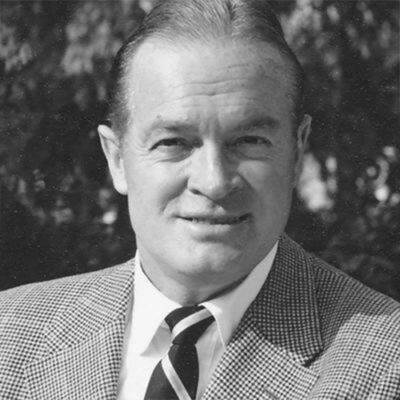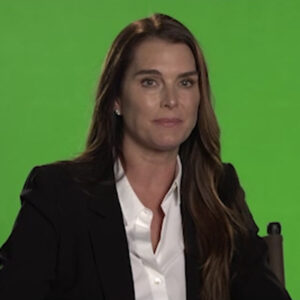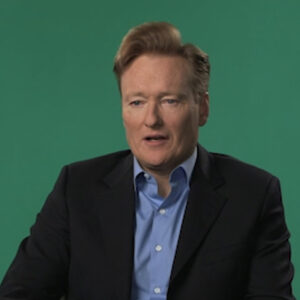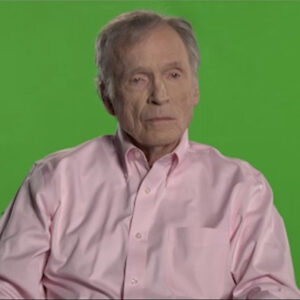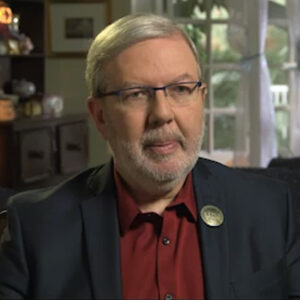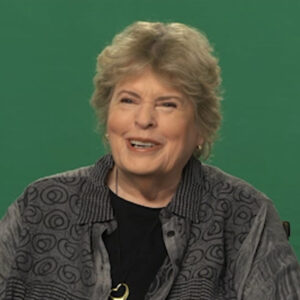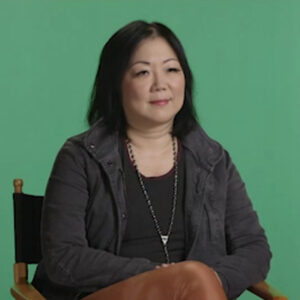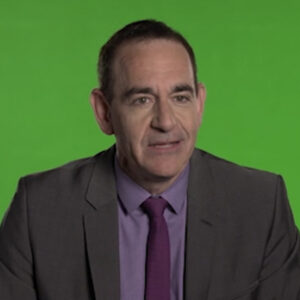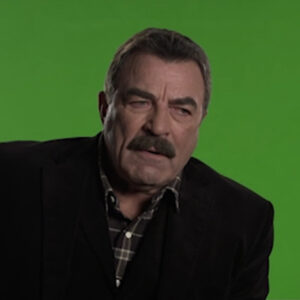Speaker Describe Bob Hope as a person who was the Bob Hope that that’s a tall order because he had so many facets, you know, he was tireless. He was funny. When he wanted to be funny, he was reserved. Believe it or not. When he was resting or thinking about what he wanted to do that day, you didn’t go near because he was thinking about it. And I found him charming and, you know, through the years, he changed a lot. I remember the last time standing there, I went to see him towards the end and Dolores said, Bob, it’s Connie. And he refocussed.
Speaker He looked at me, he went.
Speaker Oh, hi, baby.
Speaker So he had that facility all of his life, he never changed that part of it. If he liked you, he liked you, and he made way for you for whatever problems you had or, you know, if something happened in your family, he was part of it. He would like muzzle on it and say what’s going on? And I liked him for that. I felt like he was family.
Speaker That’s great, especially when he’s told me, I said, the girls, Bob, they’re going to be 18 and 19 years old, I can’t keep leaving them on Christmas. And he said, how old are they now? I said, 18, 19.
Speaker He says, come on, we’ll take them with us. And that’s what he did. He talked me into that.
Speaker Well, so let’s let’s talk about how we talked you into the first one. Is there the bracelet?
Speaker Well, I’ll be mindful. OK, thank you.
Speaker So let’s talk about have we talked you into the first one? How did you come to be involved in the 1969 trip?
Speaker Oh, well, I was the flavor of the month, you know, at that time. And I was hotter than a pistol and doing a lot of television. I did a lot of concerts with him. And so he asked me on the set and I said, oh, I can’t go that far away from home. You know, I was sort of naive and not naive. I can’t explain it. But I wasn’t very naive about the world. I mean, I was naive about the world. And so I talked to my dad about and he said, go, you know, it’ll be good for you. So I went and it turned out to be, I would say, the most pivotal, important year of my life, 1969. And there are a lot of people who agree with me. Sixty nine. The country changed. The world changed. Even us going over there on this big ol super cuney, they called it big plane. That changed on the way home, just everything about it and of course, politics at the time was just they were roaring and I was just becoming aware of what I should be aware of in the first place. I was so busy doing my thing, you know, that I wasn’t quite aware of where I was. I was in Vietnam. I was with a lot of. Young boys who didn’t want to be there. I was with a lot of young men who were the bravest I had ever seen, and I missed my own brother who happened to be 19 years old. And he was he had a bad job. He was batting cleanup somewhere along the. Jungle’s anyway, it changed everything for me, Sixty-nine, I grew up I grew up a lot.
Speaker So talk about what you saw when you were doing those shows. Who did you see out there in the audience and how did it make you feel?
Speaker What did I see? I saw so many things I saw. I wondered why our soldiers couldn’t go in these fields that were rubber plantations. I didn’t quite know why until I found out they belonged to an American company and.
Speaker I saw a lot of displaced people. I saw. People that love designated us the same time. And. I saw so many young men.
Speaker I often wonder how many I have seen in a lifetime. It’s got to be millions. Got to be. I went down the Mekong Mekong Delta, I went away, I remember walking along the road looking at this big pagoda, wondering why it was empty and what its history was. And some woman came out of the jungle, kind of scared me. And she walked over and handed me a handful of dog tags, American dog tags. And I just remember standing there realizing the enormity of that. And I just burst out cry and searched for my own kid brother, who I didn’t know where he was at the time.
Speaker I warn you what you’d be in for. I’m sorry, I’m sorry, did Bob warn you what you were in for when you stepped out on the stage in front of all those? You know what to expect or what? What did you experience?
Speaker He he told me what to expect about the boys. They were hanging from treetops and trees.
Speaker And as far as my eye could see, there was a young soldier back there cheering away. You know, there’s a lot of footage, especially the shows that I was on. There’s one I’ll never forget it. It said where there’s hope, there’s Bob. And all kinds of things like that, and they loved us so much, I felt like somebody go for kid sister, mother. And it was just. Thrust at me all at once. I also saw the other side of it, I saw.
Speaker Young soldiers, Viet Cong.
Speaker That couldn’t have been more than 15, 17 years old. I remember once they captured these young boys and one’s head was open, one’s leg was ripped open and and I went running like everybody else to see what was going on. And I remember running up and looking and I went, oh, my God, they’re babies.
Speaker They’re babies, too. What are you guys doing, what are we doing?
Speaker And I was asked not to attend any longer, so I stopped going to the press conferences because I didn’t get. I just didn’t get it, I get it now after having done a film about it, I put my money where my mouth is and and shot with 100 women. We went back and I did a film called A Healing because there is no violence, still hasn’t happened. But a healing happened when we were there and.
Speaker I went everywhere and every base. Every place we flew out of and I met young people, I met a young guy that was a medic.
Speaker And he jumped forty seven times into the jungle and saved fifty seven of our guys. That’s a lot, and that’s an experience he probably won’t share with a lot of people because nobody gets it. Nobody saw it. You know, to jump in the middle of a threated jungle like that, and I also noticed why they were hanging onto it, because it was beautiful. Vietnam is beautiful.
Speaker What do you think you represented to those guys who saw your shows? What were you bringing them?
Speaker Well, at that time, I had hit records and I was on TV all the time in my television show was maybe one or two around the world for nine years. So I was very familiar. And anything from home at that time, especially somebody like me, was so, so needy for them. They wanted to touch you. They wanted to smell you, and they wanted to hear you laugh because it was different than the other guys. I do remember once I talk about this on stage. I used to go with Neil Armstrong all the time because he would go places that the rest of the troupe did not go. And I went with him and he’d say, I’m going to the jungle tonight, do you want to go? I go, yeah. And I put my clothes back on and a fly with him is Mervat, the fellow that flew me. His name was Chick. He just passed away and I. I met him again in Las Vegas. Can you imagine meeting the fella that flew all over it now? So anyway, I would go with him and we flew to the jungles one night and it was a hut and it was dark. They had some lights in there that sort of looked Christmassy and. They were playing music and it was a good, good sound.
Speaker Now remember Dancing with Young? Couple of young guys on this one, I talk about it a lot. I felt that I could put my finger right through his eye.
Speaker He was so deep within, I’d never seen anything like that. He wasn’t looking here. He was way back. And I said to him, I didn’t have anything to say, I was a little dopey, you know, and I said, Would you like to dance? And I remember him refocussing. And he said, yeah. And so we got up and danced slow dance, it was more meaningful than a slow dance with somebody I married. I mean, it was it was an intimate moment that I’ll never forget in my life. And then we got back in the plains and. The helicopters really took off for the night, often wonder what happened to them.
Speaker I understand there was a time you were in a helicopter with Bob, you tried to land somewhere and you couldn’t.
Speaker Yeah, I think I was down there every time I see Apocalypse. I remember that when he was looking through the blind to look at the city and they were running around, I did that. I picked up the blind and looked where I was. I am from Brooklyn, you know, what was I doing there? What could I possibly help? Why could I possibly help? And it’s amazing how you can you find a way to. Comfort someone and we couldn’t land, we went all the way back to Thailand. That was a long trip back and forth, back and forth every day.
Speaker Every single day, how was Bob throughout that? Why was it so important for him?
Speaker He would he would do it. He felt it was. I think he found if he felt that it was not only part of his life, part of his legacy, he said he’d do it and he was going to do it. And he was right there with us most of the time, even when I landed on the sanctuary in the middle of an ocean of dark ocean. And all you saw was a white ship. I mean, Bob was there. He landed to.
Speaker Here’s a guy who, when you went to Vietnam with him, was in his 60s.
Speaker Yeah.
Speaker At an age when a lot of men retired and here he was, as you said, sort of you don’t think he had an age.
Speaker What drove him? I never knew how old it was. I don’t know anybody his age, but he was tireless and I knew when to not disturb him because he slept with his eyes open. You sit in the chair and he go and just relax.
Speaker And you didn’t know whether he was asleep in. A lot of young people would come by and I’d say, don’t bother him right now. He’s asleep. He is, yeah.
Speaker What drove him? Why did he have to do this?
Speaker I don’t know what drove Bob because he was driven for a lot of years. Not only he loved soldiers. He really admired them. I think he was sorry he couldn’t run out there with him again. He admired the generals that were leading the forces. He was very close to them all and he would be very proud to introduce me to them, you know, and he would tell me his history. And so I think. He was high on that.
Speaker A.
Speaker Aspiration aguy. He looked at somebody with different eyes, especially those who served in the military as lowly people, wasn’t quite as they did.
Speaker He give you any advice in terms of how to deal with the guys while you were there?
Speaker Not really, because every time there was a lull, he’d go Konnie and I’d come running out. Yes. OK. There’s a wonderful clip I’ve seen of you singing Silent Night.
Speaker Oh, yeah. It was a reason for that.
Speaker The first time that whole night.
Speaker You know, it was right in the middle of the in the and he said that day something like. You president’s doing everything he can to get you home. They went nuts. It started 16000 back and they didn’t think we were, you know, and that nobody cared. And there was a lot of discomfort and talking and a few boys booed and it was just getting out of hand.
Speaker And I was standing.
Speaker So I was standing on the side of the stage.
Speaker Devastate all the drugs.
Speaker And I, like everybody else, wondered what was going on, so I was looking out there, I hadn’t changed my dress from the first dress.
Speaker And he hollered for me at.
Speaker Yes, you know, so I went out there and the whole band turned around, looked at me and he said, Singham, a little something.
Speaker And he left the stage and left me there. I looked at oh.
Speaker And I said, well. It’s Christmas Eve, and I know your families would love to be here.
Speaker Hold your real tight squeeze in. Just talk to them like that, like I would. And I started to sing Silent Night.
Speaker And you could hear a pin drop.
Speaker I think there were over 20, 30 thousand in denying that that day and. All of a sudden. Way in the back. Some of the boys started singing with me. And my flesh became. Alive, I can’t explain it because I was one with them and I was one because I was an American. And they were proud as hell and they all started singing, and pretty soon they all started standing and singing and I’ll never forget it. And he used to ask me to do it all the time, that. To sing the song was never quite the same as that, as you can imagine. I looked in their faces and it meant so much to them that it was like the biggest Christmas present you could ever give. And I was proud to be a part of that. I did the right thing.
Speaker By accident, how did people react to getting booed aside from leaving you out there alone?
Speaker What did you see in him? Oh, it’s got to be a rare thing.
Speaker I didn’t know how he felt about it. I know that he wanted off the stage. He didn’t want to get unruly or out of hand. And he was good at, you know, he could stop anything or start something, and it was just past points and he he didn’t want to take it on. So he threw me out and it turned out OK, because we all came marching out, Neil came out. And the girls came out right away to sing with me and everybody joined in to watch what was supposed to happen in the first place, and then he came back out and there was no problem. It was over.
Speaker That’s great, that’s great. Did being there that year, um, change your perspective, change your perspective on the war in any way on the war?
Speaker Yes, very much. I just thought that there were too many places that were. Commercialized that people were there for the wrong reasons and I didn’t know what the right reasons were, you know what I mean? I was so young and I just did get that war. And of course, I was so worried about my brother who was batting cleanup, which meant that they go in after they take over a village and he did not like it. It was. It was sad because he couldn’t handle it, couldn’t handle his life when he got home. I often say that the wall of the young men who did not make it. After the war is longer than the one that’s in Washington. He lost his life, I guess it was. Yeah, 40, less than 40, and he. Because I had stepped foot there, this is very strange. He’d call me 2:00 in the morning, want to talk about it, you know what happened to me? He talk about these tunnels. I went down the tunnel and I saw this young boy. He was very upset all of his life because he did not kill this boy. And it was a tunnel where. He said he couldn’t he was too young and he was in a hospital bed and I finally went through the tunnels and I saw what my brother, what he was taught all of his life was compassion and kindness. I could see it because I felt that way when I saw the two 15 year olds, you know, what was that about? And. I just felt the resolve could have been better other ways we had the wrong people in. We’ve got to watch that carefully, too, even today.
Speaker And yes, I understand you did a performance at the White House.
Speaker Yeah, about that, do you hear about this? Well.
Speaker I went to the White House, of course, with Bob and so forth, and and, you know, when you walk in, you take a no unliveable. So I took the number out of the bowl smiling, talking to everybody. And they said, oh, you won the seat next to President Nixon.
Speaker So I went, oh, my God. Oh, what am I going to say?
Speaker Because I was pretty opinionated after I came back from Vietnam.
Speaker So I sat with him and we actually had a good conversation. We both named our daughters the same name and that funny. And so we were talking away and. Well, what was I going to tell you that was so important about oh, so anyway, I sang a song, Bob said, you know, Bob, honey is back at bat again.
Speaker So I go off and had the band all rehearsed and everything, and I’m singing.
Speaker And all of a sudden I see the whole audience going, What, what? And I look over my shoulder and one of my backup singers drops. Stop the war. On a napkin. Do you remember that years ago, Carol?
Speaker I won’t say your last name, she drops this is a stop the war and I’m seeing it away and going, Oh no, it has to happen to me.
Speaker So sure enough, we got out of that, somehow ended the song, and I never saw her again.
Speaker I don’t know where she went. I don’t think they killed her, but she was persona non grata.
Speaker Uh, um, I know you appeared on Bob’s TV show a number of times, you have any particular memory, special memories of doing the regular TV show, not the Vietnam of the airplane standees that might be dropped? Oh, no. OK, good.
Speaker We project the memories of working his regular TV show.
Speaker I remember being very, very nervous and every time it seemed like it was an important moment for me, I was going to have a star spot.
Speaker I’d have a cold, oh, good fun or something was wrong. And so that’s all I remember. But I did my best.
Speaker What was Bob like as a performer to perform with? Was he a generous performer? How did the two of you work together?
Speaker He was very generous. You know, we danced together. We saw offshoot and. And the best was I made a joke and made him laugh and the soldiers knew it. It’s on film, you know, and he came up with a top or line after, you know, he said. Oh, he said a little lower, honey, I put my hands here little lower, so I went lower anyway and oh my God, you got the. It was the funniest thing as we were over there. And all the soldiers laughed and laughed and laughed and let those those special moments where it was not rehearsed or silliness that Dawid, they Dawid and he you know, I think more so because he got flustered and laughed about stuff. They wanted to see him like that. He was good at faking it, but it was better when it was real.
Speaker How good a dancer was he. Sorry, how good a dancer was.
Speaker But he was pretty good. He taught me the dance. We didn’t have a choreographer. Anything was great. He had done it before. And I have a sneaking suspicion it was always the same song.
Speaker Yeah, that’s funny.
Speaker What did you observe? What did you observe about the relationship between Bob and Dolores?
Speaker Delores. Well, she traveled with us a lot of jobs, I adored her and I was telling someone that I met her before, Bob. I’m a Catholic girl, and when I went to California the first time I was living in a neighborhood and I went to the local church and I was about four pews away from her, and she came over and she introduced herself and she said, I’m Bob Hope’s wife. And I went, Oh, nice to meet you.
Speaker I didn’t know she was.
Speaker And we remained friends all that time. She never forgot that she met me in church, used eligibility. I bet that girl church. So naturally I got favored. She was adorable and in the best moment. Outside of her reminding Bob who I was lately was we were at the Fox Theater. In St. Louis. Beautiful theater, one of our magic castles, and I remember going out there and he didn’t have violins with him this time, so I hire them 12 violins. Two cellos, two bass and. As I was going on stage. I saw Bob bring two chairs. Offstage, and he held her hand and they sat down and they were going to watch my show and I thought. What could be better than this, what could possibly be better than this, and they were so loving and so generous with their their time and their talent was nice, felt good.
Speaker What were they like together? Together? What were they like?
Speaker They were very close. She would remind him of jokes. She tells them a one the one about and he was always bragging about how good she sang and he’d say, Sing that one, honey. Sing that one. Oh, no. And then, of course, you do it. I thought they were great to last as long as they did. They had some special rapport and and in their 80s, getting close up to 90s. To hold hands.
Speaker Genuinely.
Speaker As I saw it with my own eyes backstage in the dark. Pretty, pretty cool should happen to me.
Speaker Um, growing up in Brooklyn as a kid, when did you first become aware of Bob Hope? Did you see him on TV or in the movies? Do you remember seeing.
Speaker I didn’t ever. Excuse me. Let me take one second.
Speaker Sure. But you want to take a look at yourself and be good.
Speaker So had you seen him in the movies? Had you seen him on television?
Speaker No, not at all. I saw him on TV, I think, a few times in Brooklyn, but. I was from the Dean Martin Jerry Lewis crowd, so there they were, my idols, then I became a theater girl, usherette, and I saw it living it up 33 times with my little flashlight. So I didn’t know a lot about Bob, but I sure did when I got home the first time. I thought, oh, he’s really a big star. He was, too. And he was very dear to me, intellectual, maybe it was because I wasn’t, but whenever he would start talking about important things, I’d quick run over and sit down and make believe I was just passing by. You know, I like to hear and I always thought of him as an adult. Never. A personal friend, Paul. A lot of artists always mentioned that in and I think to myself. I never thought of them that way, and I was close to them and joked with him, made them laugh, and so I never thought of him as my.
Speaker My equal.
Speaker Interesting, yeah, um, do you feel you’ve got to see the real Bob Hope or was he always. The on screen, Bob Hope, all the time.
Speaker I’ll never know because I wasn’t with him that much, but whenever I was with him, he was consistent, loving, funny.
Speaker Dedicated. And very generous of his time.
Speaker Not generous with flowers.
Speaker I got up once, I think, uh, did you ever see him or you when you were there? Never least bit concerned back in Vietnam, seeing with bombs going off and whatever. Were there any times where it is a little like, I’m not so sure about this?
Speaker Yes. And Danang when the helicopter came in. And we were landing here’s the stage. And just as we came about that far, they started picking up again, if you could hear the shells in the distance and they said, get out of here. And it was immediate. And when we came in the next day, they had shelled where we were going to entertain. So that made me think a little bit. This is for real.
Speaker Last question, a lot of people today, the young generation doesn’t even know the name, but I know. How does that make you feel?
Speaker Makes me feel old because he was so big and so. Giant, he was a giant and for this generation not to even know is Ismay’s or Dean Martin and Jerry Lewis for that matter. I mean, I suppose it has to do with how we were raised and who was popular, but I thought he’d be popular all of our lives for. I’m sure he will be, but it’s going to take people like you and me to tell the truth about him.
Speaker That’s great. How did you feel when he passed away? What went through your mind?
Speaker You know, I’m sorry.
Speaker I went to get ashes lead right now and this church, St. Charles in the Valley, because I’ve moved to the valley and that’s where the ceremony was for him and that was the last time I was there. So. It was full circle for me the other day because I was sitting there looking and remembering what it looked like because I had never been there before that day. It was. Amazing, there were quires. From so many churches, there were priests from all over the world. I forget how many, but there were a lot of monsignor’s and what have you and. It was very befitting, it seemed like that. That was the proper way because he did have that natural ability to, for instance, we would and he would never turn down a Catholic universities and things like that. I noticed I played a lot of them with him and he would always know the message. So he had one foot over that picket fence, you know? In the churchyard. So it was very befitting, it was beautiful. I’d never seen anything like that outside of the Vatican, so I liked him.
Speaker I can genuinely say I liked him, I miss him, and I’m glad I knew.
Speaker One in a million, the whole family, for that matter. Kelly, I used to run around with that. And Linda, who I think is absolutely beautiful and all the kids, Tony and Delores. Can you imagine? I’ve known her since I was 15.
Speaker That’s a long time, a long time ago, get just one day Richard told about.
Speaker Oh, OK, can we talk again? Let’s go back to Vietnam. This tells me a truck went by at one point when we were talking about how Bob was received by the guys in Vietnam.
Speaker Talk a little bit about what you noticed, about how the guys responded to him on stage and wait for the plane this way. Planes.
Speaker For the most part, he was received. Everywhere. As long as it was a guy or an officer with the Green Berets just stood at attention when Bob came by, they had a tremendous respect for him because Bob. Transcended where we were into their homes and their families. My mother loves you. My sister loves you. She wants to marry you. And you know what? I would say it was more than just a show. And that’s why I think he was very particular on how they perceived him. And that day that he said the president’s doing everything he can to get you. They did not like that. They didn’t feel it was truthful. And I think that they opened his eyes a little bit. You know, it was like he was shocked by it.
Speaker Like what? Sometimes it takes that.
Speaker Did his jokes go over well, did they find him funny if his jokes didn’t go over well?
Speaker He would blast them like they were dogs. He would say a bad word, wasn’t it?
Speaker And then he would pick on the guys with the cue cards and Barney McNulty and all these fellas that were doing things for many blame them. And, you know, he turned it into something special. It was fun, I remember Barney McNulty, who is the cute card guy we were in Diego Garcia, it’s a long way away. Do you know what it is, Diego Garcia? I wonder if I should tell this. It’s a place out the middle of the ocean where we have. A young soldier, sailor, one of every.
Speaker Cor.
Speaker Who could speak the language, listening to the computers all around the world and they stay on eight hours a day, so I went there with Lee Greenwood, we sang to them in their ear while they were turning knobs, but. It started to rain and we were supposed to do this show and I can still see Barney McNulty.
Speaker Who loved Bob with with the cue cards on his head, walking through the jungle soaking wet? I mean, I have never seen a man and and the cue cards were dripping. Oh, God. And I stood there, laughed, and he said, Don’t you be laughing. Which is great. So those kind of things you really can’t explain to anybody, nobody cares, but except another guy who knows what it’s like to care for every cue cards that are dripping.
Speaker And you needed those cue cards, didn’t he? What? Did Bob really need those cue cards? Yeah.
Speaker He needed the cue cards to just remind him where he was, I guess, what year it was.

